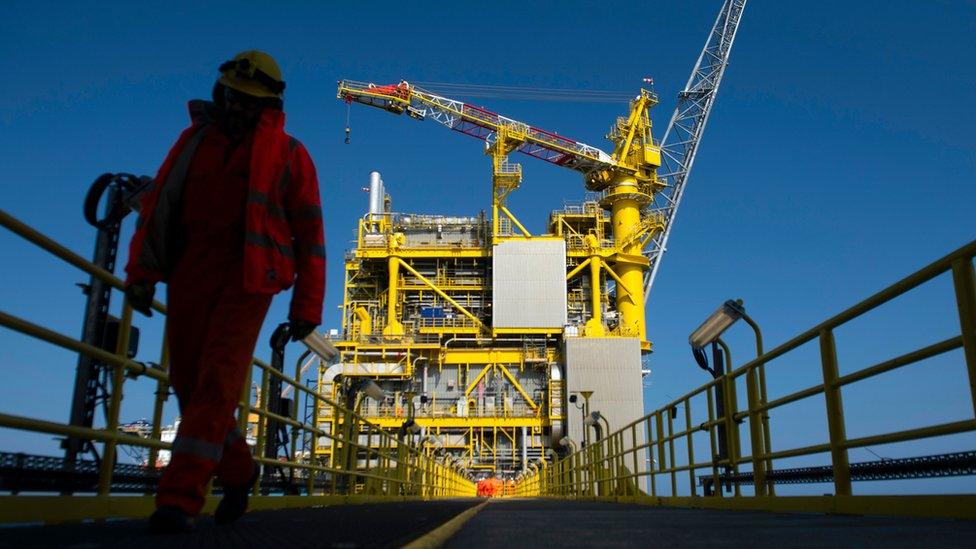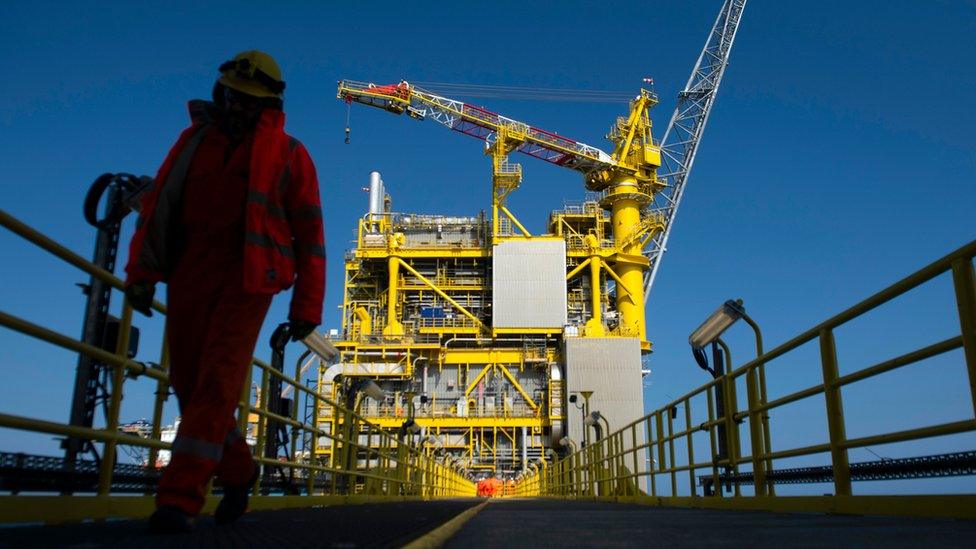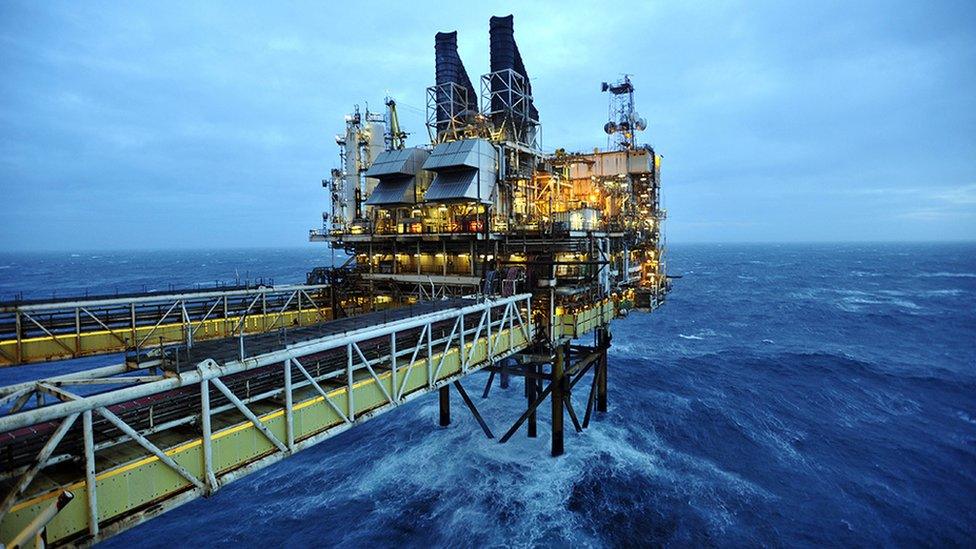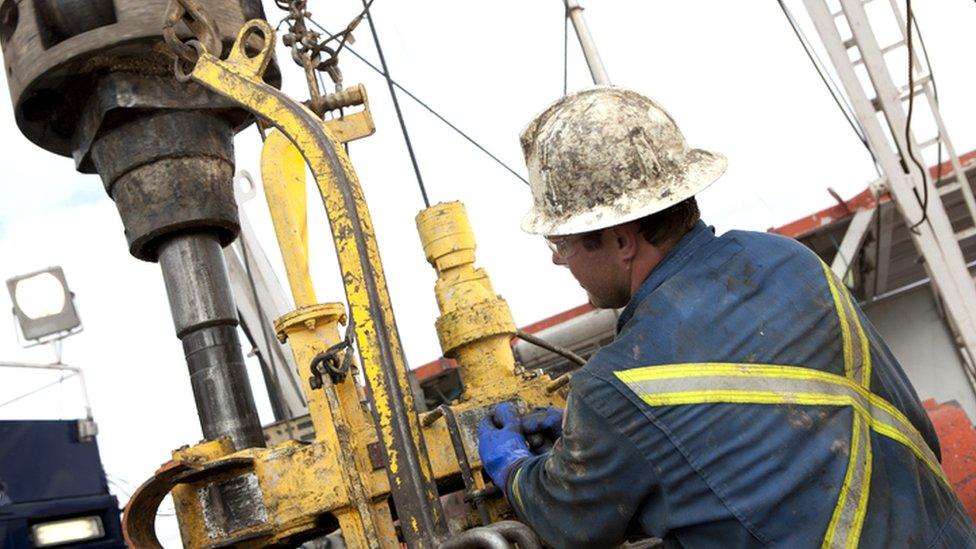Cambo: Ithaca Energy pledges to develop controversial oil field
- Published

Ithaca Energy has purchased the majority stakeholder of the Cambo oil field project - and pledged to develop it
The controversial Cambo oil field off Shetland could now be developed after the owner of the field was bought by another energy firm.
Siccar Point Energy - which put the project on hold when Shell pulled out - has now been acquired by Ithaca Energy in a $1.5bn (£1.125bn) deal.
The new company has pledged to develop Cambo and the nearby Rosebank field.
Campaigners have criticised plans to develop Cambo, warning exploiting it would exacerbate climate change.
Greenpeace said it would consider taking legal action if the UK government approved oil extraction from Cambo.
Ithaca's chief executive Alan Bruce said Cambo and Rosebank were "two of the largest undeveloped and most strategically important discoveries" in UK waters.
Developing them, Mr Bruce added, was a "huge opportunity to not only help secure the UK's energy future for at least another quarter of a century, but also to create thousands of direct and indirect jobs in the process."
A spokeswoman for Shell, which still owns a 30% stake in Cambo, told the BBC that it had nothing to add to its statement in December when the oil giant said it had "concluded the economic case for investment in this project is not strong enough at this time, as well as having the potential for delays."
The Cambo oil field is thought to contain 800 million barrels of oil, but its development has not yet received final approval from UK government regulators.

Cambo has been a key target for environmental lobbyists
The Scottish government said that unlimited extraction of fossil fuels was not consistent with its climate obligations.
The first minister has said previously that the project should not get the green light because of concern over climate change.
Nicola Sturgeon told BBC Scotland her view had not changed.
She said: "North Sea oil and gas is really important right now to Scotland's energy provision and to jobs and employment and economic activity across the country.
"The skills, the infrastructure and the expertise of oil and gas is going to be important in making the transition to renewables and low carbon sources of energy but we need to make that transition so when it comes to decisions about energy for the longer term, our focus should be much more on renewables."
The first minister added: "We have got this massive opportunity in the form of offshore wind in Scotland to provide energy and provide a massive export opportunity and to provide lots of jobs as well.
"We all know the world has to move away from fossil fuels so, in terms of decisions about the future, we should be concentrating on renewables."
Greg Hands, UK government energy minister, told BBC Radio's Good Morning Scotland programme the decision on Cambo would not be made until an environmental assessment had been carried out.
"Each individual field needs to be given consent, needs to have an environmental study done on it, and I don't want to pre-empt that," he said.
"The change in ownership of Cambo, or part of Cambo, that is a commercial decision for those companies."
'Be more supportive'
However, he said he wanted oil and gas extraction from the UK to increase instead of importing gas from abroad and "certainly not from Russia".
"I'm seeking to reduce our imports of hydrocarbons from abroad, which are typically much more emission intensive," he told BBC Scotland.
"In the UK we are blessed with the fact that 50% of our gas is produced in the North Sea.
"I want to see all of us, including the Scottish government, be more supportive of the North Sea oil and gas sector, particularly in the north east of Scotland - 100,000 jobs are at stake."
Referring to the development of nuclear power plants in England and Wales but opposed by the Scottish government, he said "now is not the time to be ideological about energy, now is the time to be practical and deliver energy improvement and deliver energy security".
But Mr Hands added that the UK government was "absolutely committed to taking action on climate".

The Cambo oil field

Located in the North Atlantic, about 125km (75 miles) north west of the Shetland islands.
Major stakeholder is Siccar Point Energy, with a 70% stake, backed by private equity firm investors.
Siccar Point Energy previously said Cambo could deliver 170 million barrels of oil over 25 years, and 53.5 billion cubic feet of gas.
The exploration licences dates back to 2001, but UK government must approve drilling - which could start as early as 2022.

In December, Siccar Point Energy, the project's majority stakeholder, said it was pausing the Cambo project one week after its partner Shell pulled out.
Shell had a 30% stake in the field but said the economic case for investment in the North Atlantic project was "not strong enough".
Siccar Point Energy said it would continue talks with the UK government over the future of the field.

Analysis by Harriet Bradshaw, BBC Scotland climate change reporter
Let's be clear, this news isn't the greenlight on Cambo, it's a pledge, words.
There are still significant hurdles to get over if the development were to go ahead - markedly an environmental assessment and regulatory approval.
But there is a notable shift in the mood music from industry here and such signals, alongside the timing, are noteworthy.
Last December plans for Cambo were on ice.
But a lot has changed since then.
This takeover announcement came on the same day the UK government released its energy security strategy, with plans to accelerate North Sea oil and gas projects.
Coincidental? Perhaps.
But on timing, this announcement also came the same week the world's leading climate scientists urgently reiterated a need to substantially reduce overall fossil fuel use, or face climate catastrophe, with UN Secretary General Antonio Guterres saying: "Investing in new fossil fuel infrastructure is moral and economic madness".
And this is why environmental campaigners are responding yet again fiercely to the notion Cambo could be back on the table, repeating their concerns about the future of the planet.

On Wednesday, the UK government released its energy strategy, which covered plans to boost UK energy independence and tackle rising prices.
The plans included a new licensing round for oil and gas projects in the North Sea - something the Scottish government dismissed, saying it was not a long-term solution to energy concerns.
The UK government said its commitment to more North Sea projects recognised "the importance of these fuels to the transition and to energy security", adding that producing gas in the UK had a lower carbon footprint than that imported from abroad.
But its climate advisers last month said UK-produced gas would be sold internationally and would barely reduce the consumer price.
'Different investors will get rich'
Tessa Khan, director of environmental group Uplift, said on Friday that the key to lower fuel bills was renewable energy.
She said: "Cambo's oil passing from one set of investors to another makes no difference: it is still in private hands and will be sold to the highest bidder, with most of the oil going abroad.
"Eighty percent of the UK's oil is exported. This isn't our oil. It won't lower our bills. All that's changed is that a different set of investors will get rich."
Caroline Rance, from Friends of the Earth Scotland, said increasing UK oil and gas production would not protect consumers or alleviate the climate emergency.
"The new owners of Cambo will be desperate to profit from their billion-pound gamble meaning that they will be hellbent on selling any oil they might extract to the highest international bidder," she said. "Ithaca would take the profits but the public would bear the risk."
Philip Evans, from Greenpeace, said the UK government should be "doubling down" on renewable energy and "tackling the huge amount of energy waste in the UK".
Speaking to BBC Scotland's Lunchtime Live, he said :"If Cambo goes ahead, you can expect environmental groups to challenge it every step of the way, and Greenpeace would consider taking legal action."
He added: "Most of the oil from Cambo would be exported because UK refineries are unable to process the type of oil the field contains and, as it belongs to private companies, would be sold to the highest bidder on the international market."
Related topics
- Published10 December 2021

- Published3 November 2021

- Published30 March 2022
